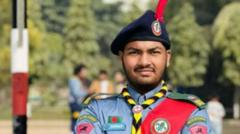As Bangladesh commemorates the anniversary of the removal of former Prime Minister Sheikh Hasina, the mood is mixed with joyous celebrations and concerns about rising extremism and political instability. Activists call for genuine reforms while grappling with the aftermath of a contentious political transition.
Turbulent Transformation: Bangladesh Celebrates Leadership Change Amidst Growing Tensions

Turbulent Transformation: Bangladesh Celebrates Leadership Change Amidst Growing Tensions
The anniversary of Sheikh Hasina's ousting sees celebration in Bangladesh but highlights the tumultuous challenges ahead for a new interim government.
Amidst jubilant celebrations in Dhaka, thousands gathered this week to mark the anniversary of Sheikh Hasina's departure as Prime Minister of Bangladesh, signaling hopes for a "New Bangladesh." Acting Prime Minister Muhammad Yunus and leaders from various political parties came together in the rain, promising a future dedicated to democracy for the country's 170 million populace, amidst rallies, concerts, and prayer sessions.
However, the jubilations seem to mask a deeper, troubling reality over the past year. Rights organizations point to alarming instances of mob violence, revenge attacks, and the revival of religious extremism, posing serious challenges to the established democratic processes. In exile in neighboring India, Hasina continues to evade allegations tied to a violent crackdown on opposition during her tenure.
Activists like Shireen Huq, who previously led the Women's Affairs Reform Commission, describe the transitional phase as a regime change overshadowed by misogyny, where male dominance still reigns supreme. The commission, which proposed crucial recommendations for advancing women's rights, has faced fierce pushback from Islamist groups, particularly Hefazat-e-Islam, indicating a volatile cultural landscape.
Huq expressed disappointment over limited backing from the interim government amid backlash from hardliners, who have increasingly targeted women and minorities. The decline in tolerance toward diversity and rising aggression towards dissent remain pressing issues as calls for women's rights advocates go unsupported.
As factions resent the previous regime, violence against Awami League supporters has been reported, countered with an ongoing crackdown by the interim government. Journalists sympathetic to the former administration face harsh penalties, amplifying fears of a lack of accountability across the board.
Student leaders, who played pivotal roles in the uprising, now find themselves in crucial governmental positions. While some believe these young leaders have fostered a democratic dialogue, critics warn that populist pressures may misguide governmental decisions, particularly regarding upcoming elections, which may exclude opposition voices if current trends persist.
With a flourishing economy and maintained foreign reserves hinting at potential stabilization, the future of Bangladesh remains uncertain. As police violence and authoritarian practices persist, activists and analysts emphasize that true transformation requires a break from past practices to ensure that the sacrifices made during the uprising are not in vain.
The political landscape looks formidable, with the next six months projected as critical for reshaping Bangladesh's future and addressing ongoing injustices. The path ahead is steeped in both hope and uncertainty as voices continue to advocate for a truly equitable and democratic society amidst increasingly polarized sentiments.


















